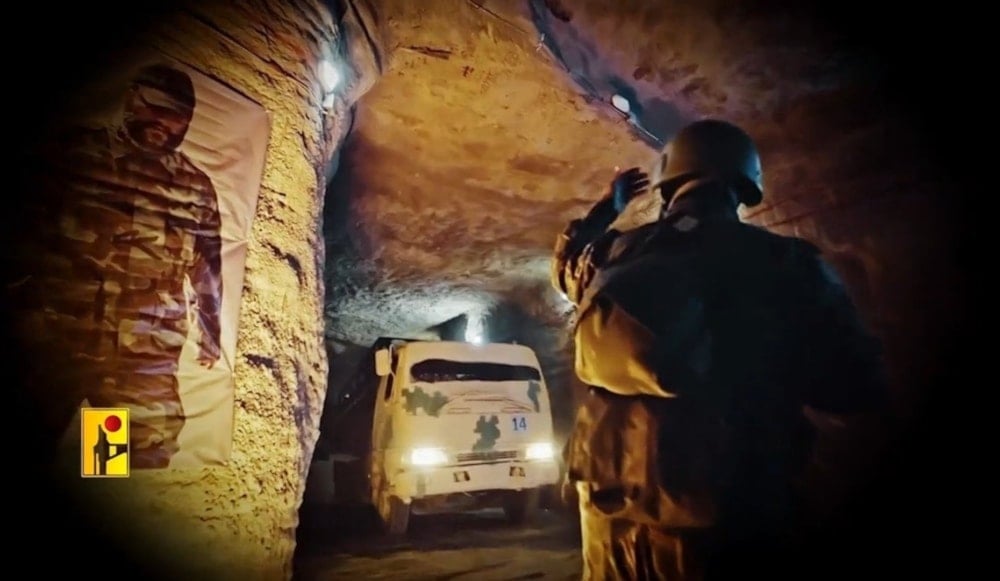Hezbollah still able to hurt 'Israel', has not used 10% of power: Ynet
The Israeli newspaper notes that the scope and quality of Hezbollah's recent operations do not represent the full capabilities of the Lebanese Resistance group.
-

A screen grab from a video shows a vehicle in Hezbollah's Imad 4 facility (The Islamic Resistance in Lebanon)
Despite the severe blows it received in the last week, Hezbollah did not lose its mental sharpness, the Israeli newspaper Yedioth Ahronoth pointed out on Thursday, pointing to the Lebanese Resistance group's unprecedented launching of the Qader 1 ballistic missile toward Mossad's headquarters in Tel Aviv's suburbs.
The newspaper highlighted that the latest development "was a historic landmark" for the group, whose Secretary-General Sayyed Hassan Nasrallah promised during the 2006 war "to bomb Haifa and beyond."
Now, Hezbollah can bomb beyond Tel Aviv as well, it emphasized.
The report noted that contrary to what could be expected, the scope and quality of Hezbollah's recent operations do not represent the full capabilities of the Lebanese Resistance group.
"This is a war, no doubt, but one that is not yet close to what it could be," Yedioth Ahronoth suggested.
The Israeli newspaper also indicated that the severe blows Hezbollah received as a result of Israeli strikes, including the pager and walkie-talkie attacks and repetitive assaults on Beirut's Southern Suburb, do not mean that it has lost the ability to hurt "Israel", underscoring that the group has not yet used 10% of its power for its own considerations.
Yedioth Ahronoth cited estimates that Hezbollah plans to respond to the massive Israeli strikes, warning that, amid a state of euphoria among decision-makers and part of the public, a few Israeli achievements do not erase a year of failures and a crisis of confidence.
On Tuesday, Daniel Hagari, the spokesperson for the Israeli occupation military, acknowledged that Hezbollah still has more capabilities of different kinds.
"Our job is to take care of each of them, but first of all, we are focusing on its strategic capabilities that pose a greater risk to the Israeli home front," Hagari told reporters.
This comes as Hezbollah, in defense of Lebanon and its people, continues its strategic operations against key Israeli military bases in occupied lands with various weaponry amid the Israeli aggression on southern Lebanon and the Bekaa region that has killed at least 500 people, injured thousands, and displaced hundreds of thousands.
Israeli ground invasion of Lebanon 'death trap' set by Hezbollah: Ynet
In a separate report, Yedioth Ahronoth discussed the potential consequences that the Israeli occupation military could face if it initiated a ground invasion of Lebanon, describing the move as a "death trap" set by the Lebanese Resistance group Hezbollah.
The report comes shortly after the occupation military issued a statement announcing the call-up of two reserve brigades for "operational missions" in the northern regions on the border with Lebanon and after Israeli Chief of Staff Herzi Halevi told troops to prepare for a possible ground invasion into Lebanon.
The Israeli newspaper doubted the military's immediate readiness for an invasion, despite pointing to the deployment of regular and reserve forces to the northern border, including the 98th Division.
At the same time, according to Yedioth Ahronoth, the majority of the top leadership believes that "Israel" made a tragic and bitter mistake by invading Lebanon twice before, in 1982 and 2006, and it should not repeat the same mistake.
The report suggested that "Israel's" current behavior resembles its actions at the beginning of the 2006 war when it believed it could defeat Hezbollah through air power alone without a ground invasion.
The newspaper recalled that when this strategy failed and Hezbollah persisted with its launches toward Israeli cities and towns, the military was forced to invade Lebanon in a war that "failed to achieve any of its objectives."
In his speech last week, Hezbollah Secretary-General Sayyed Hassan Nasrallah mocked "the foolish commander of the [Israeli] northern command's suggestion to establish a security belt" in South Lebanon to force the Lebanese group to retreat from the border.
Hezbollah's fighters, according to Sayyed Nasrallah, were "thoroughly looking" for Israeli tanks and viewed any invasion as a "golden, historical opportunity" to strike.
"If the enemy establishes a security belt, it must understand that it will be ambushed and the zone will turn into a swamp and a quagmire in which it will be mired," the Lebanese leader warned.
Read more: Israeli ground offensive in Lebanon not imminent: Pentagon

 4 Min Read
4 Min Read










